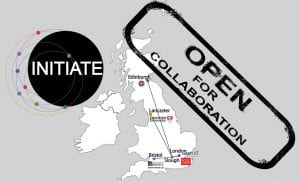 The EPSRC-funded INITIATE Project is officially announcing the opening of its testbed for 3rd party projects to explore many key capabilities for Internet research including optical networks, wireless/ RF communications, the Internet of Things (IoT), Software Defined Networking (SDN), Network Function Virtualisation (NFV) and cloud /edge computing. The network and services among the connected sites are deployed and managed by the INITIATE Exchange, which is central to the whole infrastructure.
The EPSRC-funded INITIATE Project is officially announcing the opening of its testbed for 3rd party projects to explore many key capabilities for Internet research including optical networks, wireless/ RF communications, the Internet of Things (IoT), Software Defined Networking (SDN), Network Function Virtualisation (NFV) and cloud /edge computing. The network and services among the connected sites are deployed and managed by the INITIATE Exchange, which is central to the whole infrastructure.
The project offers a unique, distributed network research testbed currently with access to five of the leading networking labs across the UK, interconnecting operational, state-of-the-art laboratories at the Universities of Bristol, Lancaster, Edinburgh and King’s College London as well as at Digital Catapult, London. It is ready to support the increasingly complex at scale experimentation required for future Internet research, by combining expertise of the UK network research and innovation communities.
The INITIATE Exchange services provide a scalable and easy plug’n’play framework for future testbeds to join in. Moreover, it allows dynamic deployment of services across testbeds in addition to the capability to interconnect with other established test networks (e.g. NDFF, GEANT etc.), as well as commercial networks. In summary, the INITIATE testbed provides an opportunity for large-scale, complex experimentation across the UK. This capability has already been tested and verified within the DCMS 5G Testbeds and Trials programme as a 5GUK Exchange.
Examples are two recent world firsts 5G musical performances, which used the INITIATE infrastructure to test and showcase the potential of ultra low-latency, high bandwidth, and full synchronisation delivery over a 5G network.
‘Orchestrating the Orchestra’ audiences had the opportunity to immerse themselves in the world of 5G and experience a three-way distributed music performance across Bristol, King’s College London and Digital Catapult.
Our second showcase was a live music lesson conducted by jazz musician Jamie Cullum, attended by pupils at Bristol, Birmingham and London and, for the first time, the commercial 5G network of BT/EE and the INITIATE academic network were connected.
The cross-site synchronisation was flawless, with low network latency allowing performers and audience to experience the music as if the artists were performing in the same venue.
Mr Luis Lopez-Bracey, Portfolio Manager, UKRI (EPSRC) said: “As distributed computing and applications become more prevalent, and in line with UKRI’s strategy to explore challenges related to Networks and Distributed Systems (e.g. reliability, interoperability and scalability), this announcement provides a fantastic opportunity for community engagement and exploitation of this cutting edge facility. The official opening for 3rd party projects represents a fantastic opportunity to experiment with complex, large-scale projects in a dynamic fashion. INITIATE will facilitate experimentation required for future internet research and complement the Government’s £200m allocation towards the 5G Testbeds and Trials Programme.”
Professor Dimitra Simeonidou, Director of Smart Internet Lab said: “University of Bristol is proud to lead the delivery of the INITIATE testbed. INITIATE opens a unique capability for open research and innovation in the technology and application layers of Next Generation Internet. We are now looking forward to welcome experimenters and innovators outside the immediate project collaboration and create an active ecosystem to utilise the testbed.”
Professor Harald Haas Director of LiFi Research and Development Centre (LRDC), University of Edinburgh said: “We are absolutely delighted to be able to participate in the development of a national Internet experimentation infrastructure which serves as an integrator and translator for cross-disciplinary research in computer networking, wireless communications, computer science, software engineering and artificial intelligence technologies “.
Professor David Hutchison, Professor of Computing, Lancaster University said: “INITIATE will provide experimenters with a wide-area platform for experimentation with new networking technologies including NFV and 5G, as well as practical collaborative opportunities for research in diverse, but interconnected, fields. Lancaster supports the project through isolation of distinct experimenters’ traffic, access to advanced networking platforms, and exposure of topical data, such as in green energy monitoring.”
Dr Toktam Mahmoodi, Associate Professor in Telecommunications and Director of the CTR, King’s College London said: “INITIATE will open up an innovative approach to Internet experimentations, and foster dialogue between technologists and Internet users, allowing co-creation and co-design. The project has already created a diverse eco-system of researchers in the Internet domain including wireless, optics and computer systems and has shaped a user community of artists, medical experts and entrepreneurs. We are delighted to be part of this initiative, and its vibrant eco-system.”
Dritan Kaleshi, Head of 5G Technology and 5G Fellow, Digital Catapult said: “The INITIATE project represents an important contribution to building experimental advanced digital infrastructure networks in the UK that allow large scale experimentation for network systems in a secure, interconnected advanced networks environment. Digital Catapult’s 5G testbed in London offers access into this infrastructure, allowing for any organisation to use the network to research how their products or applications can benefit from using it, helping to scale their business or simply test the next stage of the development of their product. We’re very pleased to continue to work with our partners, which are globally recognised leaders in network systems research and industry players, to further the application and adoption of advanced future networks in the UK.”
Further Information
The Engineering and Physical Sciences Research Council (EPSRC) is the main funding body for engineering and physical sciences research in the UK. By investing in research and postgraduate training, we are building the knowledge and skills base needed to address the scientific and technological challenges facing the nation.
Our portfolio covers a vast range of fields from healthcare technologies to structural engineering, manufacturing to mathematics, advanced materials to chemistry. The research we fund has impact across all sectors. It provides a platform for future UK prosperity by contributing to a healthy, connected, resilient, productive nation.
EPSRC is part of UK Research and Innovation, a new body which works in partnership with universities, research organisations, businesses, charities, and government to create the best possible environment for research and innovation to flourish. We aim to maximise the contribution of each of our component parts, working individually and collectively. We work with our many partners to benefit everyone through knowledge, talent and ideas. For more information visit UK Research and Innovation.
The Smart Internet Lab at the University of Bristol and our 5GUK Test Network
The Smart Internet Lab at the University of Bristol is a hub for internet research which addresses grand societal and industrial challenges. We perform cutting edge research on optical and wireless communications and offer a unique holistic approach to hardware and software co-design, solving critical problems in the global internet evolution. We are world leaders in 5G convergence research and have deployed 5G capability in Bristol city centre focusing on the convergence of fibre infrastructure and 5G wireless access. The University of Bristol’s 5GUK Test Network is the UK’s first urban 5G End-to-End Testbed.
The University of Edinburgh’s LiFi Research and Development Centre (LRDC) is dedicated to accelerating the development of LiFi as a major global industry, through creating the pipeline for innovative ideas, technologies, products and partnerships. By facilitating collaboration between industry, internationally renowned experts from the University of Edinburgh, and other key research institutes around the world, the Centre is taking emerging LiFi technologies through into mainstream applications that will soon begin to impact on many aspects of the modern world.
Using the plentiful, free and unlicensed visible light spectrum, LiFi technology can transmit high-speed data and unlock capacity which is multiple times greater than that available within the currently used radio communications. LiFi technology has the potential to enable faster, more reliable internet connections, even when the demand for data usage has outgrown the available supply from existing technologies. The Centre continues to drive all aspects of LiFi communication from novel devices, through to the integration of complete LiFi networks in agile heterogeneous 5G and 6G networks enabled by emerging artificial intelligence technologies in combination with software defined networking (SDN) infrastructures.
King’s College London The Centre for Telecommunications Research (CTR) is a dynamic research centre based in the Department of Engineering, drawing talented researchers from the world over and reacting rapidly to the changing technological landscape. Some 50 researchers are currently working within the centre, including academic staff, research staff, research students, and visiting academics. CTR is linking its research base to the wider economic implications of telecommunications technology. It is now widely acknowledged that the next generation of leaders in the complex environment of telecommunications will need to acquire strong business acumen, management and leadership skills.
The Networking group at Lancaster University’s School of Computing and Communications (SCC) has a strong background in developing new networking technologies and properties including Quality of Service, Software Defined Networking, cyber security and resilience, and the applications that depend on or can exploit them, such as distributed multimedia systems. The Lancaster networking group also has a long history and expertise in building and experimenting with advanced network testbeds, and currently runs a very large testbed using SDN and NFV technologies as well as the latest routers and switches. This testbed capability forms the basis of the Lancaster contribution to INITIATE.
Digital Catapult’s mission is to accelerate the early adoption and applications of advanced digital technologies. We bring together the entrepreneurship of startup businesses, with large corporations and academic research. Our energy is focused on stimulating the right market conditions for our focus technologies so that they develop for the benefit of the UK economy. By creating the demand and enabling the means to develop new products to solve challenges, we find, nurture and support the best companies to get to market faster. Find out more about Digital Catapult at www.digicatapult.org.uk and follow us @digicatapult


No comments yet.